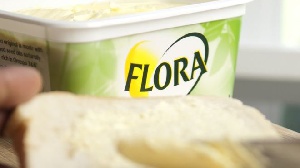Unilever, which owns some of the UK’s most famous household brands, has announced plans to sell its margarine business, including Flora and Stork.
The move comes as part of a wide-ranging review at the Anglo-Dutch firm, which recently saw off a takeover bid from US food giant Kraft Heinz.
Analysts have said the sell-off could fetch $6bn (£4.8bn).
Unilever also intends to look at changing its historic status as a dual-listed company in two countries.
“We always have worked our operational model and driven efficiency,” Unilever’s chief executive, Paul Polman, told the BBC’s Today programme.
He said Unilever would not change its long-term business model, which he described as one of “sustainable value-creation”.
Drive ‘further value’
Alluding to the failed takeover bid, Mr Polman added that “the events of the last few weeks have pointed out that we have opportunities to drive further value in the business”.
Mr Polman said the firm would step up its cost-cutting, aiming for a 20% margin by 2020.
He said the margarine business was a “declining segment” that could be “better managed by others”.
Mr Polman said Unilever was studying whether to change its status and was looking at the wider “legal structure” of having bases in both the UK and the Netherlands. It will decide by the end of the year.
“Obviously it’s a very complex thing, the dual structure, and it requires the right focus to come to the right conclusions, but it will certainly simplify our organisational structure,” he told the BBC.
The sale of Flora and Stork, two staples of the British kitchen, had been flagged up in advance, and was a predictable response to the takeover approach from America’s Kraft Heinz three months ago.
The surprise package was Paul Polman’s decision to look at Unilever’s historic dual-listing structure, a quirk that has its roots in the company’s creation when Britain’s Lever Bros merged with the Dutch margarine maker Unie in the 1930s.
Dual-listed companies are rare, and shareholders generally don’t like them, not only because of the increased cost and complexity that comes with supporting two corporate structures, but also because they can be useful defences against takeover bids.
That Unilever plans to scrap the dual listing shows how much simmering shareholder unrest was precipitated by the Kraft approach.
Analysts say that changing consumer habits are partly behind Unilever’s move out of spreads.
“The planned separation of Unilever’s spreads business… is the result of the decline the division has seen in recent years, particularly in the US,” said George Salmon of stockbrokers Hargreaves Lansdown.
“The reality of 21st Century life is that people are more likely to grab breakfast ‘on the go’ rather than sit around the table with a few slices of toast.”
Business News of Sunday, 9 April 2017
Source: theheraldghana.com













